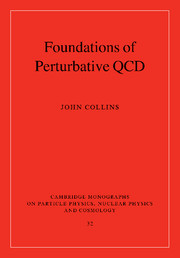Description
Foundations of Perturbative QCD
Cambridge Monographs on Particle Physics, Nuclear Physics and Cosmology Series
Author: Collins John
A systematic treatment of perturbative QCD, covering the concepts, theorems and their justification, ideal for graduate students and researchers.
Language: English
Subject for Foundations of Perturbative QCD:
Approximative price 58.62 €
In Print (Delivery period: 14 days).
Add to cart
Foundations of Perturbative QCD
Publication date: 11-2013
Support: Print on demand
Publication date: 11-2013
Support: Print on demand
Approximative price 137.18 €
In Print (Delivery period: 14 days).
Add to cart
Foundations of perturbative QCD
Publication date: 04-2011
638 p. · 18.4x25.5 cm · Hardback
Publication date: 04-2011
638 p. · 18.4x25.5 cm · Hardback
Description
/li>Contents
/li>Biography
/li>
The most non-trivial of the established microscopic theories of physics is QCD: the theory of the strong interaction. A critical link between theory and experiment is provided by the methods of perturbative QCD, notably the well-known factorization theorems. Giving an accurate account of the concepts, theorems and their justification, this book is a systematic treatment of perturbative QCD. As well as giving a mathematical treatment, the book relates the concepts to experimental data, giving strong motivations for the methods. It also examines in detail transverse-momentum-dependent parton densities, an increasingly important subject not normally treated in other books. Ideal for graduate students starting their work in high-energy physics, it will also interest experienced researchers wanting a clear account of the subject.
1. Introduction; 2. Why QCD?; 3. Basics of QCD; 4. Infra-red safety and non-safety; 5. Libby–Sterman analysis and power counting; 6. Parton model to parton theory I; 7. Parton model to parton theory II; 8. Factorization; 9. Corrections to the parton model in QCD; 10. Factorization and subtractions; 11. DIS in QCD; 12. Fragmentation; 13. TMD factorization; 14. Hadron-hadron collisions; 15. More advanced topics; Appendices; References; Index.
John Collins is Distinguished Professor of Physics at Pennsylvania State University. He has lengthy experience in perturbative QCD. He has proved a number of the fundamental theorems which form the main content of this book, and has a record of formulating and deriving novel results in QCD. During his career he has received several awards, including a Guggenheim fellowship, a Humboldt Research Award, a Mercator professorship and the J. J. Sakurai prize.
© 2024 LAVOISIER S.A.S.
These books may interest you

Multiquark Hadrons 86.49 €

High-pT Physics in the Heavy Ion Era 103.03 €

